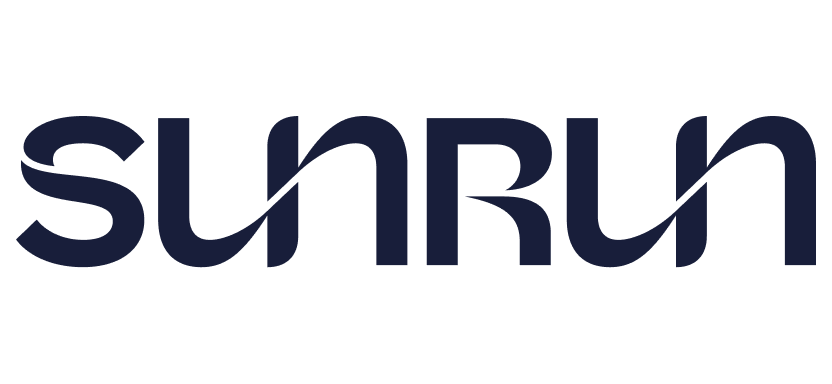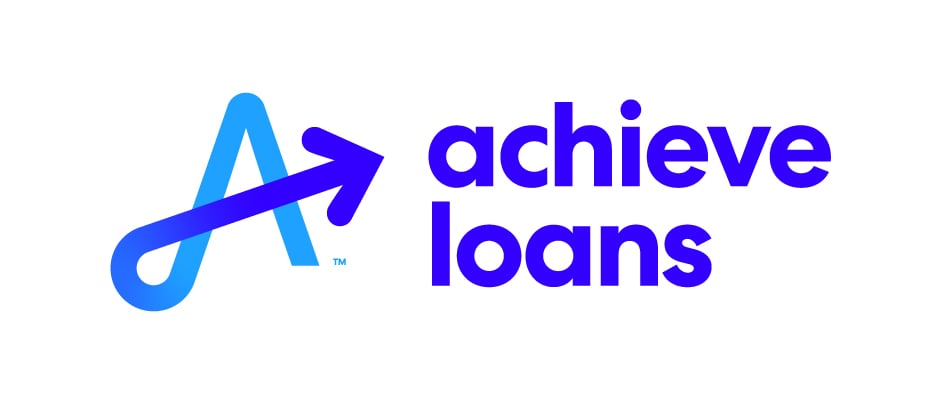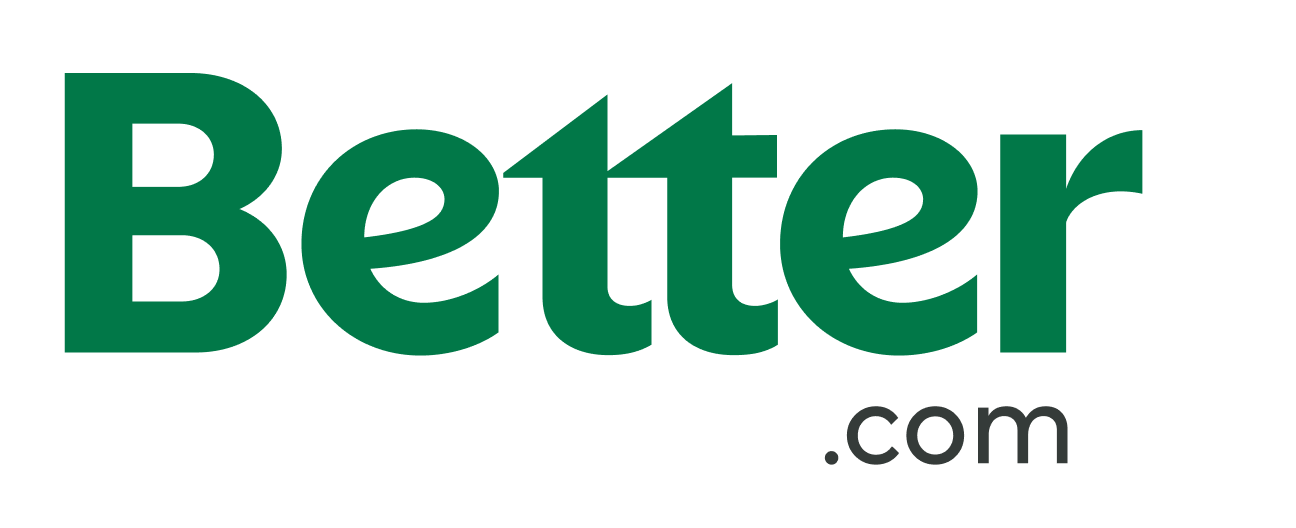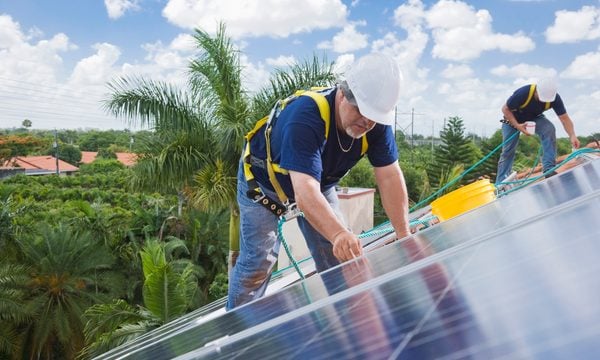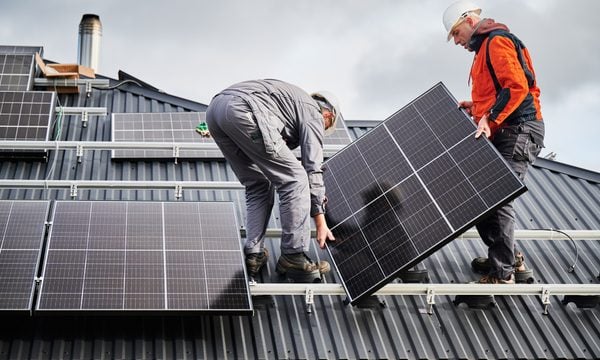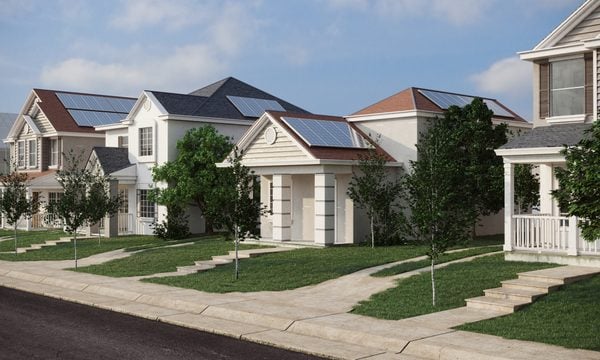What Is Solar Leasing? Pros, Cons, What to Know
Solar leasing requires less money up front and the repairs and maintenance are covered, but your savings may suffer.
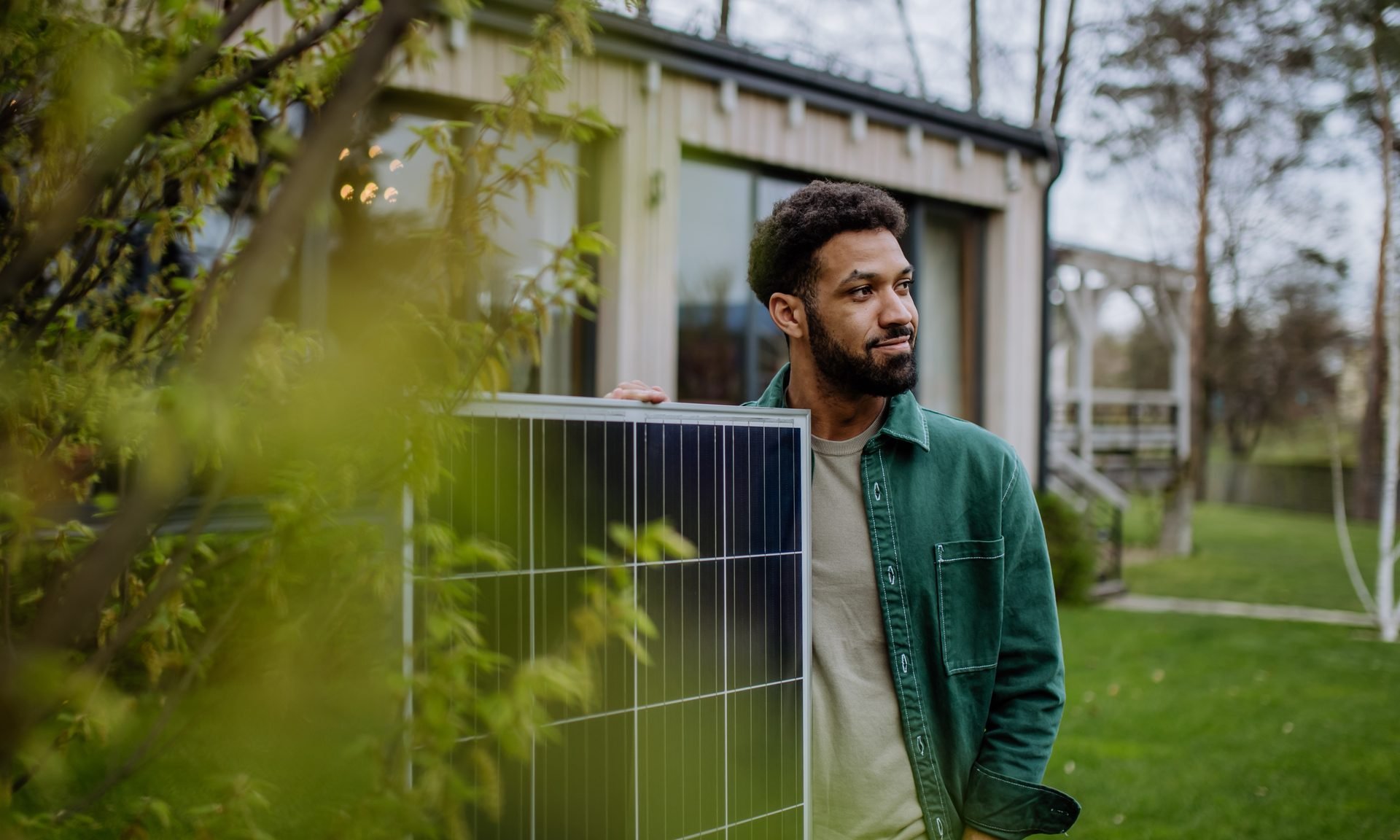
Some or all of the mortgage lenders featured on our site are advertising partners of NerdWallet, but this does not influence our evaluations, lender star ratings or the order in which lenders are listed on the page. Our opinions are our own. Here is a list of our partners.
How does solar leasing work?
Solar leasing allows homeowners to use energy from rented solar panels. Instead of making a down payment, homeowners typically agree to make monthly lease payments for several years. Solar leasing can be especially good for people who don’t qualify for solar loans and don’t plan to move soon.
» MORE: Best solar companies of 2024
| Solar leasing pros | Solar leasing cons |
|---|---|
| No money down. | You don’t own the panels, so you don’t qualify for tax incentives or rebates. |
| Predictable payments per contract. | Price escalators could increase the monthly payments. |
| Access to clean solar energy. | Electric savings aren’t as large as they would be if you owned the panels. |
| Easier, faster approval than solar loans. | Home value won’t increase. |
| Lower electric bills. | May make it more challenging to sell your home. |
| Not responsible for maintenance/repairs. | Panels and their service may not be top quality. |
5 things to look for in a solar lease
Solar leases aren’t all alike, so it pays to compare. Here are some features to look for.
- Performance guarantee: This ensures the homeowner will be compensated if the solar panels fail to produce a stated minimum amount of electricity. Performance guarantees are also an excellent incentive for the leasing company to maintain the solar panel system properly during the lease.
- Low or no escalators: Escalators are increases in the monthly payment (usually between 1% and 5% annually) . They’re common in solar leases, but you may be able to find a lease with no or minimal escalators. Before making your final choice, calculate the total cost of the lease over the full term. A lease with no escalators might start with payments so high that a competitor with much lower starting payments and small escalators could actually be the better deal.
- $0 down: In general, this is a desirable feature. Solar panels last a long time. Making a down payment could lower the lifetime cost.
- Company stability and reliability: Ask how long they’ve been in business and how many solar power systems they’ve installed through solar leases. Check the Better Business Bureau, read verified customer reviews and get personal customer references. Additionally, find out who will repair and maintain the leased panels, and confirm that technicians are certified by the North American Board of Certified Energy Practitioners (NABCEP).
- Automatic payment options: Your monthly payment may be lower if you sign up for automatic payments .
Pros of solar leasing
Solar leasing offers some distinct advantages.
- Often no money due upfront: Leases provide a way to learn the pros and cons of solar panels without making a large initial investment.
- Cleaner, greener energy: By using less grid electricity, you’ll lower your carbon footprint. Solar energy also reduces water consumption .
- Quick and easy approval: Generally, it’s easier and faster to qualify for and get a solar lease compared with a solar loan.
- Savings on your electric bill: You get to use the electricity that the solar panels produce. So if your lease payment is less than what you were paying for electricity from the grid, you could save money every month.
- No worries about repairs or maintenance: The solar lease company is responsible for repairing the panels and performing solar maintenance on the panels.
- Predictable payments: You know exactly what you’ll pay each month; it’s specified in the lease contract.
» MORE: Do solar panels work at night?
Risks of solar leasing
There are also some significant drawbacks that come with solar leasing to be aware of, such as:
- Not qualifying for tax incentives. Because leasing isn’t the same as owning (and leasing doesn’t involve a share in a community solar project), you don’t qualify for the federal tax credit or for state tax incentives. In fact, the solar lease provider gets the tax breaks .
- Price escalators. These contracted annual increases (usually between 1% to 5%) are common in solar leases, so it’s likely your costs will continue to rise over the life of the lease.
- No increase to property value. Although purchasing solar panels may increase the value of your home, solar leases usually don’t improve property value.
- Possible difficulty/complications selling your home. Prospective home buyers may not want to assume your lease when you move. If you’re unable to transfer the lease to the buyer, you may be stuck with an expensive lease buyout when you sell. Some companies will allow you to take the panels with you and continue the lease from your new home .
- Reduced savings on your electric bill. The cost of lease payments offsets your savings on electric bills.
- Panels may be lower quality. Leasing companies may not use the best solar panels, which means you might not reap the full solar energy production potential in your location.
- Service may be poor. Customers may have difficulty getting leasing companies to perform maintenance on solar panel systems.
» MORE: Pros and cons of solar shingles
Can I get financing for a solar panel system?
In addition to tax incentives and rebates, there are options available. Many solar installers offer financing, but you may also be able to finance your solar investment through a home equity loan or home equity line of credit (HELOC). These options may have lower interest rates than financing with an installer, future opportunities for refinancing and possible tax benefits.
Home equity loans and HELOCs are ways to borrow against the value of your home, converting equity into cash. With a home equity loan, you receive a lump-sum payment and then pay it back at a fixed interest rate over an agreed period of time, typically from five to 30 years. HELOCs are more akin to a credit card, something you use as needed. You’ll usually have 10 years to draw from the line of credit, during which time you only have to pay interest, and after that you pay both the principal and interest. HELOC interest rates typically are variable, meaning your monthly payment could rise or fall over time. And with each of these options, you're using your home as collateral.
Advertisement
Min. credit score 600 | Min. credit score 600 |
Min. down payment N/A | Min. down payment N/A |
Another option is a solar loan. Many banks, credit unions and online lenders offer these to fund solar panels and installation, with amounts typically from $1,000 to $100,000, and annual percentage rates ranging from 6% to 36%. They function like a personal loan: you receive a lump sum and repay it in equal monthly installments over a set period, typically two to seven years. And unlike with home equity financing, there is no collateral required for a solar loan. This means your home or solar panels aren’t at risk if you miss payments, but you may have to pay late fees.
So, yes, you likely can get financing. If you go this route, compare interest rates, terms and fees with any financing package that a solar provider may offer you to ensure you get the best deal.
Frequently Asked Questions
How long is a solar lease?
A solar lease is typically 20 years long or more.
What happens at the end of a solar lease?
When your lease term ends, you can either purchase the panels, have the panels removed or renew the lease. If you renew, the lease provider may remove the existing panels and install new ones.
What happens if I die before paying off my solar lease?
If you die before your lease ends, the lease may transfer to your spouse. If you’re not married, your estate may have to pay off the lease obligation, unless you’ve named a specific beneficiary to take over the lease.
Article sources
NerdWallet writers are subject matter authorities who use primary,
trustworthy sources to inform their work, including peer-reviewed
studies, government websites, academic research and interviews with
industry experts. All content is fact-checked for accuracy, timeliness
and relevance. You can learn more about NerdWallet's high
standards for journalism by reading our
editorial guidelines.
- 1. National Renewable Energy Laboratory. Homeowners Guide to Leasing a Solar Electric System. Accessed Apr 19, 2024.
- 2. NERL.gov. Homeowners Guide to Leasing a Solar Electric System. Accessed Apr 19, 2024.
- 3. Solar Energy Industries Association. Solar Energy. Accessed Apr 19, 2024.
- 4. Department of Energy. Homeowner’s Guide to the Federal Tax Credit for Solar Photovoltaics. Accessed Apr 19, 2024.
- 5. Consumer Reports. The Real Cost of Leasing vs. Buying Solar Panels. Accessed Apr 19, 2024.
More like this
Related articles
AD
Save On Solar Without the Middleman
Free Instant Quote
on Project Solar's website

AD

Save On Solar Without the Middleman
- $750 OFF install with NerdWallet;
- SolarCare™: top-tier warranty & 25-year production guarantee;
- No sales commissions mean premium equipment & tech at up to half the price.
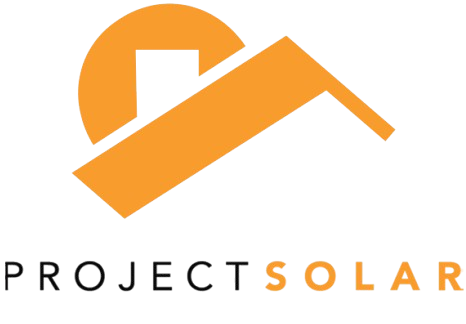
Free Instant Quote
on Project Solar's website



